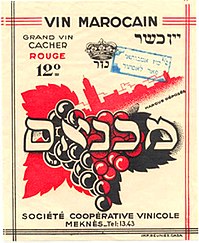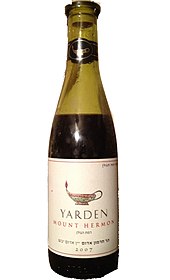Kosher wine: Difference between revisions
Undo |
|||
| Line 37: | Line 37: | ||
While none of the ingredients that make up wine (alcohol, [[sugars (wine)|sugars]], [[acidity (wine)|acidity]] and [[phenols (wine)|phenols]]) is considered non-kosher, the ''kashrut'' laws involving wine are concerned more with who handles the wine and what they use to make it.<ref name="Oxford pg 383"/> For wine to be considered kosher, only Sabbath-observant Jews may handle it, from crushing until the bottles are sealed or the wine is pasteurized, whichever occurs first.{{citation needed|date=September 2014}} |
While none of the ingredients that make up wine (alcohol, [[sugars (wine)|sugars]], [[acidity (wine)|acidity]] and [[phenols (wine)|phenols]]) is considered non-kosher, the ''kashrut'' laws involving wine are concerned more with who handles the wine and what they use to make it.<ref name="Oxford pg 383"/> For wine to be considered kosher, only Sabbath-observant Jews may handle it, from crushing until the bottles are sealed or the wine is pasteurized, whichever occurs first.{{citation needed|date=September 2014}} |
||
Wine that is described as " |
Wine that is described as "[[kosher for Passover]]" must have been kept free from contact with [[chametz]]. This would include [[grain]], [[bread]] and [[dough]].<ref name="Oxford pg 383"/> |
||
===Mevushal wines=== |
===Mevushal wines=== |
||
Revision as of 01:29, 2 March 2018
 Kosher wine label from 1930. | |
| Halakhic texts relating to this article | |
|---|---|
| Torah: | Deuteronomy 32:38 |
| Mishnah: | Avodah Zarah 29b |
| Babylonian Talmud: | Avodah Zarah 30a |
Kosher wine (Hebrew: יין כשר, yayin kashér) is grape wine produced according to Judaism's religious law, specifically, Jewish dietary laws (kashrut).
To be considered kosher, Sabbath-observant Jews must supervise and sometimes handle the entire
When kosher wine is produced, marketed and sold commercially, it would normally have a hechsher ("seal of approval") of a kosher certification agency, or of an authoritative rabbi who is preferably also a posek ("decisor" of Jewish law), or be supervised by a beth din ("Jewish religious court of law").
In recent times, there has been an increased demand for kosher wines and a number of wine producing countries now produce a wide variety of sophisticated kosher wines under strict
History

The use of wine has a long history in Judaism, dating back to
Beginning in the 1980s, a trend towards producing dry, premium-quality kosher wines began with the revival of the
Role of wine in Jewish holidays and rituals
It has been one of history's cruel ironies that the [Christian medieval]
halachically exempted from using [kosher] red wine, lest it be seized as "evidence" against them.— Pesach: What We Eat and Why We Eat It, Project Genesis[4]
Almost all
According to the teachings of the
Requirements for being kosher
Because of wine's special role in many non-Jewish
While none of the ingredients that make up wine (alcohol,
Wine that is described as "
Mevushal wines
As mentioned above, when kosher wine is mevushal ("cooked" or "boiled"), it thereby becomes unfit for idolatrous use and will keep the status of kosher wine even if subsequently touched by an idolater. It is not known whence the ancient Jewish authorities derived this claim; there are no records concerning "boiled wine" and its fitness for use in the cults of any of the religions of the peoples surrounding ancient Israel. Indeed, in Orthodox Christianity, it is common to add boiling water to the sacramental wine. Another opinion holds that mevushal wine was not included in the rabbinic edict against drinking wine touched by an idolater simply because such wine was uncommon in those times.
Mevushal wine is frequently used in kosher restaurants and by kosher caterers so as to allow the wine to be handled by non-Jewish or non-observant waiters.
The process of fully boiling a wine kills off most of the fine mold on the grapes, and greatly alters the
Recently, a process called flash pasteurization has come into vogue. This method rapidly heats the wine to the desired temperature and immediately chills it back to room temperature. This process is said to have a minimal effect on flavor, at least to the casual wine drinker.
Irrespective of the method, the pasteurization process must be overseen by mashgichim to ensure the kosher status of the wine. Generally, they will attend the winery to physically tip the fruit into the crush, and operate the pasteurization equipment. Once the wine emerges from the process, it can be handled and aged in the normal fashion.
According to Conservative Judaism
In the 1960s, the
A later responsum on this subject was written by Rabbi
Dorff concluded a number of points including that there is no reason to believe that the production of such wines is conducted as part of pagan (or indeed, any) religious practice. Most wines have absolutely no non-kosher ingredients whatsoever. Some wines use a non-kosher ingredient as part of a fining process, but not as an ingredient in the wine as such. Dorff noted that material from this matter is not intended to infiltrate the wine product. The inclusion of any non-kosher ingredient within the wine occurs by accident, and in such minute quantities that the ingredient is nullified. All wines made in the USA and Canada may be considered kosher, regardless of whether or not their production is subject to rabbinical supervision. Many foods once considered forbidden if produced by non-Jews (such as wheat and oil products) were eventually declared kosher. Based on the above points, Dorff's responsum extends this same ruling to wine and other grape-products.
However, this teshuvah also notes that this is a lenient view. Some Conservative rabbis disagree with it, e.g. Isaac Klein. As such Dorff's teshuvah states that synagogues should hold themselves to a stricter standard so that all in the Jewish community will view the synagogue's kitchen as fully kosher. As such, Conservative synagogues are encouraged to use only wines with a heksher, and preferably wines from Israel.
Regional Kosher Wine Consumption

United States
The United States of America contains roughly 40% of the Jewish population of the world, and most US wine stores, particularly in the northeast, have a small kosher section.
Historically, kosher wine has been associated in the US with the
Today, there are thousands of kosher wines available in every conceivable style from virtually all of the world's wine-producing regions.
References
- ^ T. Goldberg "Picking the perfect Passover wine" MSNBC, April 19th, 2004.
- ^ ISBN 0-19-860990-6
- ^ "Chile produces kosher wine". Wine Spectator. Retrieved 6 December 2015.
- ^ Rutman, Rabbi Yisrael. "Pesach: What We Eat and Why We Eat It". Project Genesis Inc. Archived from the original on 9 May 2013. Retrieved 14 April 2013.
{{cite web}}: Unknown parameter|deadurl=ignored (|url-status=suggested) (help) - ^ Rashi On Genesis 3:7
- Babylonian TalmudTractate Berachot 40a and Sanhedrin 70b
- ^ Elliot Dorff, "On the Use of All Wines" YD 123:1.1985 Archived 2009-12-22 at the Wayback Machine
- ^ "The 11th Plague? Why People Drink Sweet Wine on Passover". Retrieved 2011-11-04.
External links
- Kosher Wine Official Website
- "The Art of Kosher Wine Making", Star-K Kosher certification website.
- "Learn about Kosher Wine", Kosher Wine Society.
- Laws of Judaism concerning wine From the Torah and Maimonides’ Code of Jewish Law
